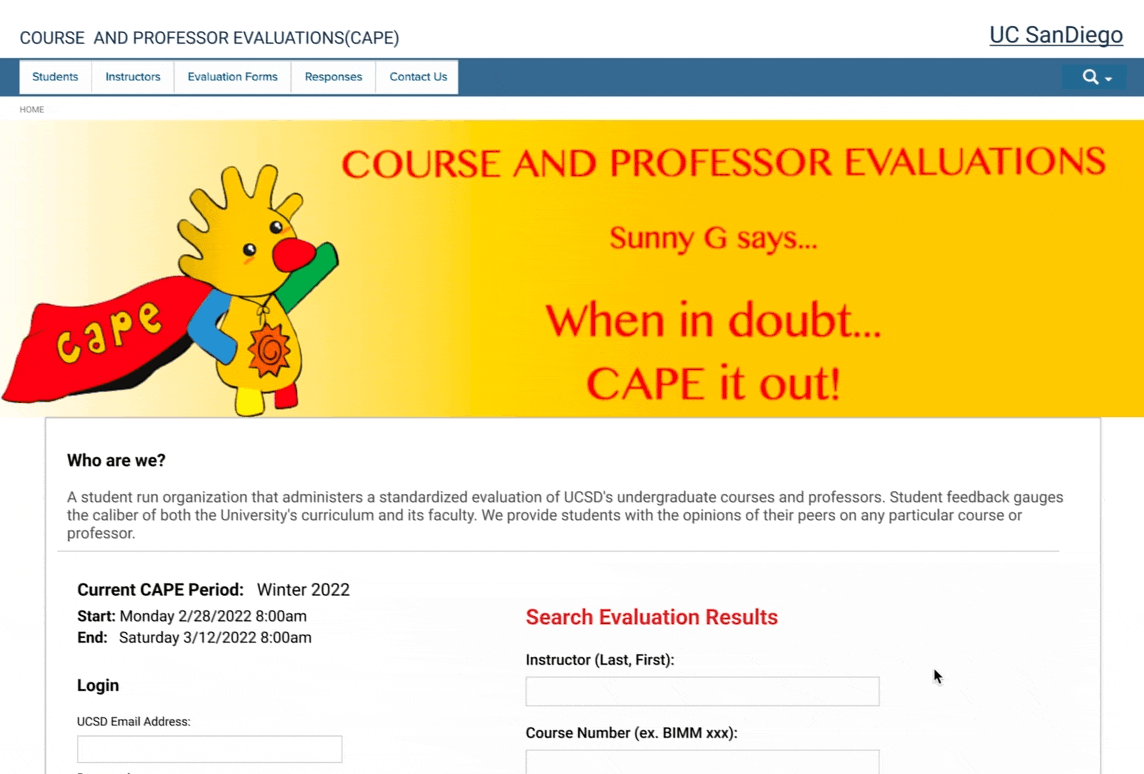CAPE
Critical Redesign
Maintaining a Dynamic Educational System through Evaluations

Problem
UC San Diego's platform for soliciting feedback discourages quality student responses and fails to provide incentive for instructors to act on student feedback.
Background
Soliciting student feedback is essential to maintaining a positive educational environment. UC San Diego's CAPE, or Course and Professor Evaluation, is a standardized evaluation platform that does this. With institutional support, it sets out to become a "catalyst for educational renewal" by inviting students to fill out evaluation forms as important feedback for their instructors and courses. Students can also view the responses of peers to learn about courses or professors.
Even though CAPE serves as an important mediator between students and instructors, we found issues for its features. First, the view feature seems to gravitate towards presenting information rather than making actual changes to the curriculum. Secondly, the evaluation feature fails to invite quality student responses due to its longevity and inflexible format. Together, these contribute to some negative implications that deviate from the original purpose of CAPE: providing helpful evaluation data and improving the educational system at UCSD.
We set out to transform the CAPE platform to encourage quality student responses and provide incentives for instructors to act on student feedback in order to maintain a dynamic and healthy educational system.
See prototype
What is Critical Design?
Critical Design is one specialized realm of design that focuses on using a critical thinking perspective to challenge societal, cultural, and ethical pre-assumptions and issues. Instead of emphasizing on the commercial aspect, it emphasizes on thinking and constructing solutions to raise awareness. In the process, designers analyze scripts, or technology, built-in environment, institutions and everything that makes a design possible.
Our project sets out to engage in critical examinations of the CAPE platform as a social and educational artifact, and proposing a counter-script as a possible reimagination.

CAPE Overview Before Redesign
Research
Survey
We started out by de-scripting the CAPE platform, or breaking down the ways that its roles, relationships, rules, values, and the institutions that use them work to structure behavior and our relationships. Besides conducting preliminary research, we also distributed a Qualtrics survey to UCSD undergraduate student body to gather their use habits and feedback. From these, we summarized several scripts:
Script 1.
Students tend to associate ratings for an instructor with the easiness of their course, thus tying the instructors’ performance to courses.
Script 2.
Students rarely leave comments due to reasons like longevity and lack of motivation.
Script 3.
Student feedback does not necessarily result in later changes in teaching or courses.
"I usually just finish all scale questions and skip the comment questions." —— Participant

"Like does my suggestion change anything?" —— Participant
We decided to choose the major script “Students rarely leave comments” to explore possible counter-scripts because commenting serves as direct verbal feedback that result in direct teaching/curriculum changes. When commenting is re-implemented in a way that facilitates this connection, it immediately drives meaningful changes and thus improves the dynamics of the UCSD educational environment
Storyboards
To counter this script, we propose potential solutions presented in the forms of storyboards, each targeting different problems reported by survey respondents.
Interviews
We conducted a discussion-based interview with five students and one-to-one interview with one instructor to ask about their reflections for the storyboards. Some significant insights follow:
-
Instead of giving explicit rewards, students are motivated to give comments when the format of the surveys dictates personalness.
-
eg. prof’s own survey via canvas.
-
-
Students like to know that their evaluations are read or have some impacts to feel more involved and valued.
-
Students want to go back to check their past evaluations.
-
Instructors do not have access to view students’ comments and need to search their CAPE results.
-
Instructors are subject to departmental evaluations which also assess instructors through CAPE results.
Solution
Finally, according to our preliminary research and storyboard reflections, we propose a counter-script. In general, we decided to divide one long survey to two short surveys: instructor & course evaluation and offer additional CAPE Course evaluation at midterm of the quarter to make students feel more involved.
Adding Tags in Comment Questions:
Encourage students to comment

Provide ideas and inspirations to generate responses
Personalized login for Prof & Student
For Students
Access personal CAPE page via Canvas, student's personal course website

Making it convenient to navigate and motivate students
View their current and past evaluations
Check submitted evaluations status as read/
unread
by profs.

Check if comments are
selected
to be taken into considerations for future changes
Students will receive email notification:
“Your comment for course COMM 124A has been selected by Prof. Lily Irani…”

They can click to view details, which directs the CAPE page
For Professors
Instead of searching their names and courses to see the comments, they can view past CAPE results including:
-
Midterm Course Evaluation:
-
Top tags to get general ideas students’ feedback about courses intuitively.
-
Download the pdf evaluation result for later review.
-
Delete the evaluation to protect instructors.
-
Full details
-

-
Final Evaluation:
-
Instructor and course recommend rates
-
Top tags based on students’ comments
-
Avoid seeing biased and inappropriate comments.
-
click to see related full comments.
-
-
See Final High Fidelity Prototype
Takeaways
Designing critically for the CAPE platform allows me to explore a new set of skills that is different than designing products. It enabled me to consider a problem's complexity from multiple angles, be it historical constructions, social formations, or institutional constraints. I have become a better thinker and a more empathetic designer through this critical redesign project.
Credit to my teammates: Marmot Bao. Tong Yuan


